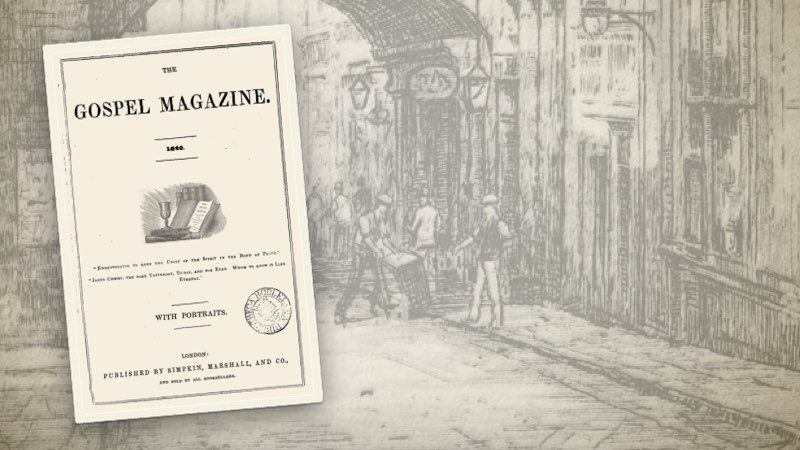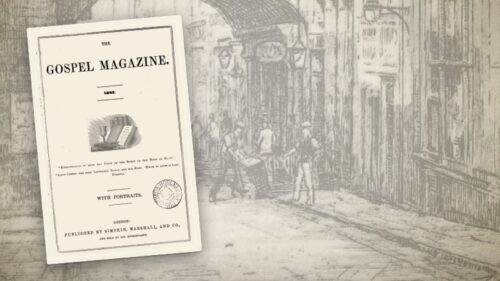
Notional Calvinism Versus Experimental Calvinism
Gospel Magazine 1840:
Notional Calvinism is a plant of common growth in this our day of widely extended profession, whereas experimental Calvinism is just as scarce as ever it was. The former, like our present popular mode of travelling may be very perfect in machinery, but if the fire be wanting it is worse than useless. A bright morning ushered in the Sabbath of—. It was the anniversary of a place of worship, where the truth of God was sown in sorrow and watered with tears. The few who frequented it assembled at the usual hour, and the gathering was small. Numbers, however, have nothing to do with the operations of God’s Spirit, any more than instruments. It is nothing with Him to help, whether with many, or with them that have no power, said one of the Lord’s children; and rams’ horns, when blown by divine directions, can level the walls of Jericho; so it after proved in this despised place of assemblage. But though the truth of God was never more fearlessly declared than on this day, yet unbelief was rearing its head. Was it God’s truth? Then why was it not more owned of Him? Was His glory displayed? Then why did he not acknowledge it? Why did circumstances combine to increase the enemy’s triumph, and to renew the church’s complaint, The wild hoar out of the wood doth waste it, and the wild beast of the field doth devour it? And why did even the mother’s children add to the woe, till the question brake forth as of old, Why should I be as one that turneth aside by the flocks of his companions?
Now, notional Calvinism will not serve us in this strait; it may help us to reason on the case thus:—The cross and man’s carnal nature are at right angles with each other, and the offence of the cross has not ceased; but it is divine experience, practical Calvinism, and a blessed realizing of the truth of God, that can alone satisfy and quiet the mind under such a state of things. There is but One who can say to the tide of unbelief, Hitherto shalt thou come, but no farther, and here shall thy proud waves be stayed? The promise for the day was looked at, it ran thus—A remnant shall be saved. O what an answer! how it broke in upon the soul in sweet reproof, rich consolation, and sovereign grace! Here, thought I, this is the word of Omnipotence “a remnant shall be saved,” omnipotence exercised for, and on behalf of, a poor despised few —the refuse, the offscouring of all, yet precious in the eyes of the Lord. This is the word of Omniscience, “a remnant shall be saved;” no doubt at all about the matter, the enemy may triumph, while the saints are fed with tears, and be made to tremble because of the way, but the end is sure. Cross bearers shall one day be crown wearers; for the Lord’s shalls and wills must be accomplished. Again, it is the word of promise, “a remnant shall be saved.” the Lord’s purposes cannot be frustrated by men or devils, and all whom He has appointed for salvation unto salvation shall come. Mercy’s building would not be complete if one stone were wanting.
Reader, dost thou know the Gospel? or art thou a notional Calvinist—able indeed to split a hair upon points important or the reverse, and yet destitute of its life and power in thy soul? Then how dreadful is thy state! This religion will not stand thee one day, and thou wilt have to receive the many stripes spoken of in the word, from thine enlightened conscience, awfully illumined by the flames of hell. But one reads this, whose heart has been touched by divine love. Brother, sister, are you united in church fellowship with a remnant? Then be not dismayed. No more was spoken of by the Lord: I condemn not distributively the mass of fashionable religionists found listening to the hunger-bitten discourses called evangelical in the present day. The Lord may have purposes of mercy for some of them, but their pretensions to the Gospel are as false as the thing they call Gospel is foul. Modem Evangelicalism is an unhallowed mixture of law and Gospel, and does the very thing prohibited typically in the old dispensation—sowing mingled seed in a field; ploughing with an ass or ox; having garments made of woollen and linen, and exchanging apparel between the sexes. This set forth the separation which was to be apparent and eternal between truth and error. The preaching of the present day is not even as good as the covenant of works; for the law set forth boldly and barely, would exhibit to the sinner his helpless condition and discover his want of a refuge, but the character of this so-called Gospel preached, is the offer of a random redemption paid for all the world, which will not be accepted because man does not choose it. The sovereignty of God when it is set forth, is carefully guarded by largely dilating upon man’s responsibility; and the work of atonement, though made as wide as the world, has appended to it the covenant conditions made with national Israel, and to which temporal blessings were annexed, a compendium of which we have in 2 Chron. 30:1 to 11. Spiritual Israelites under the law knew more of the Gospel than our modern divines. As Paul tells us, Rom. 4:1, 2, 3; Heb. 11. They shared in the national mercies on the ground of national obedience, but they realized Christ in type and figure, through the free, unconditional, irrespective covenant of grace; this was set forth in the ceremonies of the law, which the remnant according to the election of grace saw into by divine anointing, and realized by divine power. Thus in the various temple sacrifices Christ was preached. The people took no part, they merely went to look at and receive the benefit of what was transacted there for them. This discovers the Gospel, which is a viewing by faith a full, free, present and eternal salvation. A profane wit of another age could see this in the word, in the letter though not in the spirit:—“And while the priest did eat, the people stared.”
They only looked on at the sacrificial rites, but took no part; thus practically illustrating the Gospel, which is believing, not doing: as we see in Rom. 4:4. The Gospel was set forth more particularly by the year of Jubilee, concerning which Isaiah prophesied, 61:1, 2, 3; and our Lord during his ministry applied to himself, Luke, 4:18, 19. In Lev. 25 we have the feast commanded to be held on the day of atonement, concerning which day we have the Gospel most gloriously discovered. Lev. 23:26 to 32, two things were to be observed on that—1st. the afflicting of the soul, next the total cessation from all kinds of work, the former signifying the looking unto Jesus and mourning (see Zech. 12:10) under a sight and sense of sin, which made the atonement necessary; and 2ndly, the laying hold by faith, in opposition to works, of the propitiation provided, and the union of the two manifested, as death was the punishment under the law for the non-observance of the sign: the Lord thereby setting forth the Gospel which declares. This is the work of God which ye believe; and again, Believe in the Lord Jesus Christ and thou shall be saved. All manner of work was forbidden on the day of atonement, as we see in verses 28, 30, 31, quite in accordance with the Spirit’s declaration, Rom. 11:6; the day of atonement prefiguring Christ, who is the end of the law for righteousness. Now the Jubilee was to be observed at the end of forty-nine years, on the fiftieth upon this day of atonement, when the trumpet was to be blown and liberty proclaimed. And let us observe the term,—not offered but proclaimed; not the people invited to liberty, but proclamation made that the acceptable year was come, and that all the blessings and bene fits resulting therefrom belonged to every Israelite from the least to the greatest. Israel nationally saw in this the outward good of liberty and restoration of property, but spiritual Israel, the remnant according to the election of grace, saw salvation in it, and realized the blessedness of it, embraced Christ in the arms of faith, entered into Gospel liberty, and took possession of the inheritance; being predestinated according to the purpose of Him who worketh all things after the council of his own will, and that without any of the conditions, or terms, or qualifications, or contingencies of the National Covenant, to which were appended temporal blessings without one iota of spiritual life or spiritual mercy.
The vast and fatal error in most modern divinity lies in not recognising this important difference. Hence the weaklings are made weaker still by having the law dressed up evangelically, and the sinner is directed to look two ways at once—to Moses and Christ; though if he look oftener at the former than the latter, he is considered a better Christian than the poor saint who in weakness is still following the Spirit’s injunctions, looking unto Jesus; and the cry of Antinomian is raised by false brethren, who envy us our coat and our dreams. But what have the saints to fear? What have you to fear though you do “steep with tears the bread of life?” These are the footsteps of the flock, born to tribulation here, but to triumph hereafter. You have got a vile heart, a tempting devil, and an ensnaring world to combat with it is true, but in the matter of salvation you have nothing to do, it is all done; and even the command “Look unto me and be ye saved,” is with power, being spoken home to your heart by the Holy Ghost when Jesus passed by and said unto you Live. O, believer, if you can take your stand by faith, upon this immovable basis, the sovereignty of God, can see your interest in covenant love, have realized the transactions of the day of atonement, and entered upon the year of Jubilee, happy art thou. No matter who casts thee out, sinner, since Jesus has found thee, Joh. 9:34, 35. No matter who forsakes thee, sinner the Lord hath taken thee up, and if faith at this present time be in exercise, I know thou wilt join one of old who said of his foe. Yea let him take all, forasmuch as my Lord the King is come in peace. This is practical Calvinism, “more than a notion or name,” and flowing from a gracious reception of a full, free, present, and eternal salvation wrought out for an elect church in Christ Jesus.
L.
It may be argued the Strict and Particular Baptist churches of the 17th, 18th and early 19th centuries were at their strongest when they remained independent congregations, unaffiliated with Magazines and Societies. This strength was lost during the latter half of the 19th century when the churches clamored around favorite periodicals and regional associations. Although the Magazines were largely responsible for creating a party-spirit and culpable for stirring up needless controversy, they nevertheless contain many valuable resources which may prove a blessing for this generation. Although they differed on various points of doctrine, they invariably held to high views of sovereign grace, denouncing as heresy the pernicious teachings of Andrew Fuller. The majority of Strict and Particular Baptist churches during the 18th and 19th centuries were Hyper-Calvinists.




